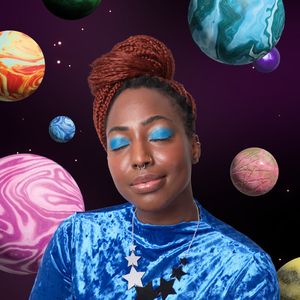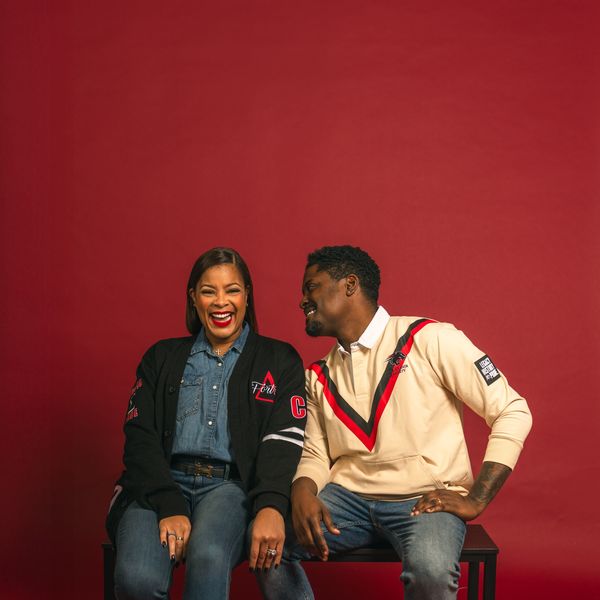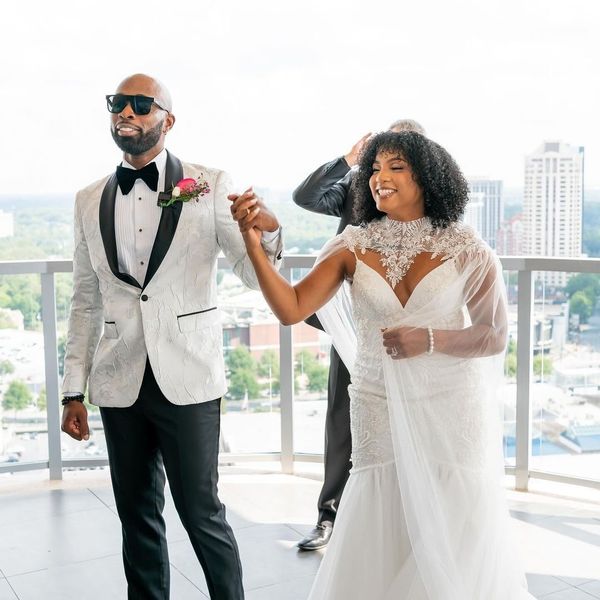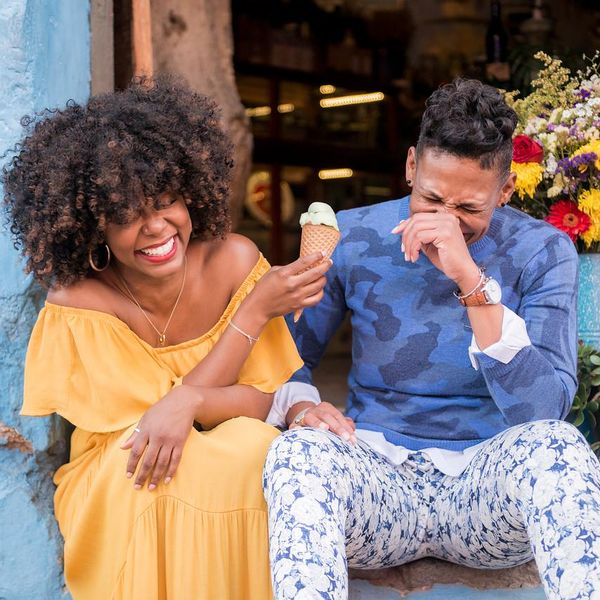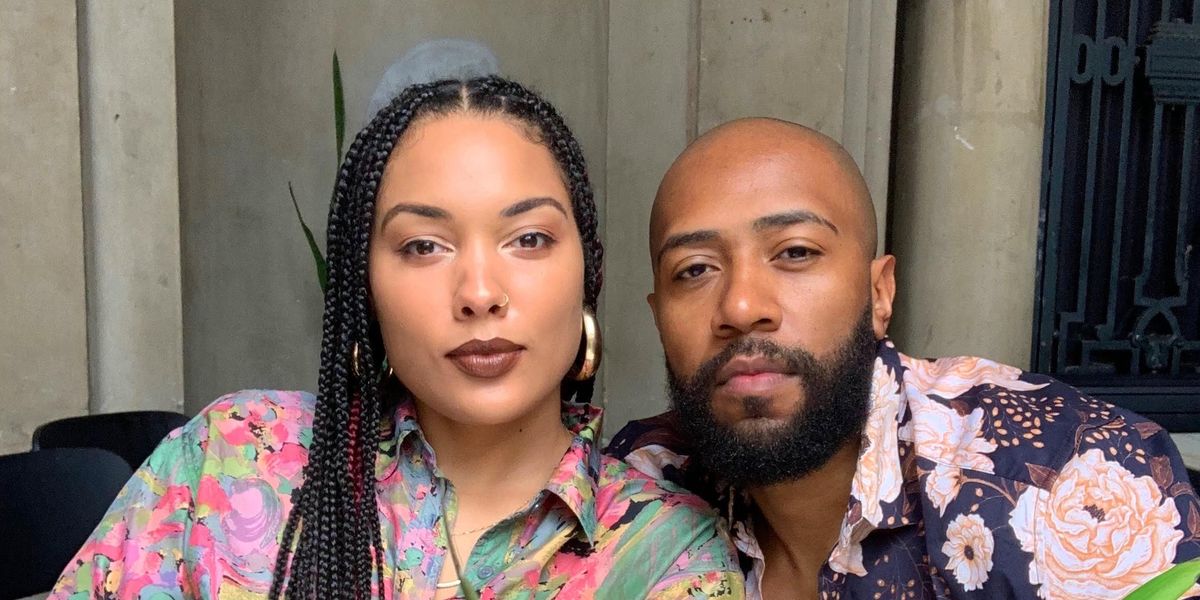
How A Couple That Never Spoke On The Phone Answered Marriage’s Call
How We Met is a series where xoNecole talks love and relationships with real-life couples. We learn how they met, how like turned into love, and how they make their love work.
As I move through life and experience different highs and lows, one thing that has become increasingly clear is the importance of self-love and self-worth. Now, I’m not saying it’s always easy, but I do feel like if it’s in a good place, people experience life more fully. And when it comes to love, my friend Amanda Wicks and her husband, Will Ford, are the perfect example.
Amanda may not remember this, but years ago, on one of her many visits back to Atlanta (we both went to Clark Atlanta University), she sat across from me at a dinner table and declared she was done looking for love. She was happy with who she was, and while she still desired it, it was no longer something she was chasing. “If it happens, it happens,” she said. The statement was so bold it made me quickly reroute our usual dating story catch-ups and awkwardly move to a different topic.
Well, the next time we met up, she told me she had met someone and was moving to Houston to live with him. Imagine my surprise and concern. Later, I’d find out that this decision, like so many other elements of their relationship, flowed naturally and organically. Their whole partnership has been full of peace and vulnerability.
Fast forward to today’s conversation, they’re still living together, celebrating four years of marriage, and planning to create a family. And while this stage of their story sounds generally normal, the way they got there is nothing but. Check out the "How We Met" feature below to see how a couple who never spoke on the phone and lived in different states ended up in a loving marriage full of ease, art, and authenticity.

Photo courtesy of Amanda Wicks and Will Ford
Walk me through your ‘How We Met’ story.
Amanda: We met on Instagram (laughs). He followed me first, and I followed back because he does art, and I was intrigued by that. Honestly, we followed each other for a while before we connected. But I remember one day I saw a post where he had on a Martin t-shirt that I liked, and that sparked our conversation. He ended up telling me he made the shirt and actually mailed me one. So when I got it, I made a post wearing it, and that’s where the conversation started. Since that day we’ve communicated every day since.
Will: Yeah, I initially saw her on a short-hair Instagram page and followed her because I thought she was attractive. I actually showed her to my co-workers on one of our monthly outings as an example of my “type” – something I had never done. But one thing I will say is, I noticed she had on a Nina Simone shirt in one of her photos, that’s what got me. It showed she had more depth.
I guess that answers my next question. Did you have an initial attraction to each other?
Will: (Laughs) Yeah, I did.
Amanda: For me, no. I just wasn’t looking at him through that lens. I didn’t follow him because he was attractive. I don’t follow people online because of that. I actually remember a time when we were going back and forth, and I was like, “Aye, you kinda cute.” It was a specific moment. Once I started looking through his page more often, I started to view him that way, but it still was more of an acknowledgment. We really connected primarily because of our creative interests.
So, how did it go to the next level?
Amanda: I was in Nashville, and he was in Houston. But I’m somebody where if I feel like doing something, I’m going to do it. I had been meaning to go to Houston for a while to see a friend, so I felt like it was the perfect combination of a circumstance. We had been talking a lot, and I knew I liked him as a person and really wanted to meet him, but of course, I was aware of the idea that it could blossom into more. I remember I sent him a text saying, “Would you think I was crazy if I pulled up to Houston?”

Photo courtesy of Amanda Wicks and Will Ford
What was your reply? Did you think she was crazy?
Will: In my mind, I was like, I don’t know. (Laughs) I wanted her to, though, so I wasn’t going to say yeah. It was a little wild, but I encouraged it.
Okay, so tell me about the date.
Amanda: I don’t know if you’d call it our first “date,” but the first time we met, we went to a skating rink. I was a little nervous about meeting him in person. Like, what if we don’t have chemistry – that was in the back of my head a little. But I brought my friend with me as a buffer, and thank God I did because he was so quiet the whole night. I literally can’t think of one thing he said the entire time. But the saving grace was that we had built a rapport. We reconnected the following night and were together until 5 a.m. – just sitting there talking. We ended up spending the whole weekend together.
Will: I’m socially awkward if I don’t know you. Also, before the date, I didn’t know what she sounded like or anything because, that’s another thing, we hadn’t talked on the phone. (They both really don’t like phone calls, so everything was through texts at this point.) I guess I could say I was kinda nervous, too. I had never met someone through social media, and then here I was, meeting her in person at a skating rink. I hadn’t skated in years, I was hoping I didn’t fall. But we had just been talking so much that I was open to it.
What made you want to take that risk?
Will: She has a level of authenticity that I’ve never seen in any other woman before, and once I saw her, it solidified that. I knew I wanted her around.
Amanda: I don’t think it was anything specific. It’s not hard for me to connect with people. But there were no red flags. We align across the board. That was different. We really connect on how we see the world.
"She has a level of authenticity that I’ve never seen in any other woman before, and once I saw her, it solidified that. I knew I wanted her around."

Photo courtesy of Amanda Wicks and Will Ford
Out of curiosity, what are your love languages?
Amanda: I connect with all of them. I think it just depends on what I’ve been lacking. I appreciate words of affirmation because I’m so big on actions that I like those bold statements of love, and of course, I appreciate quality time. The older I get, the more I appreciate physical touch, but that’s not something I need. With receiving gifts, I like thoughtfulness, and I like giving thoughtful gifts, too. But acts of service is for sure my biggest one. I love when someone considers me and makes my life easier. That speaks to me most.
"I love when someone considers me and makes my life easier. That speaks to me most."
Will: I think it all depends on how I’m feeling, too. But probably also acts of service. I like how Amanda will buy me deodorant when I run out (laughs). She just does so much all the time to show that I’m thought of.
At what point in your connection did y’all have the “what are we” conversation?
Will: I don’t think we ever had that convo. We never defined anything, we just kinda went with how it was going. However, I knew I wanted it to be more serious when I went to visit her. She had been coming to Houston once a month, and I went to Florida (she was there for work) to see her. I realized I felt comfortable coming into her space, too. That gave me that last little bit of whatever I needed.
Amanda: Yeah, I can’t say I had a defined moment like that. But again, as we had more and more interactions, there were just no red flags. The more we thought about it, the more we realized no matter where we went relationship-wise, we were adamant about being a part of each other’s lives. We never had the “talking to other people” conversation or anything. But we did both understand we weren’t going anywhere. Eventually, it graduated to convos around building a life together, but even that was over six months in. I just liked him as a person.
Have there been any negative revelations that your partnership and marriage have taught you about yourself?
Amanda: I’ve always felt that partnership is supposed to make the other person’s life easier. For me, it was a struggle to let someone help me in all the ways I didn’t really know I needed help. As I started having less capacity, I had to realize that it doesn't work anymore. It was hard for me to acknowledge and ask for help. I think that’s something I am still coming to terms with, even with other relationships in my life.
Will: I think I’m learning and still learning how to get out of my head. I’m the kind of person who always has to visualize stuff before it happens. And this relationship is the first thing that I don’t do that with. Of course, we plan stuff, but I know it’s gonna be good regardless. It allows me to stay in the moment. If I can do that with this, which is the most important thing to me, why can’t I do that with other things?

Photo courtesy of Amanda Wicks and Will Ford
What challenges have you faced together?
Will: For me, the preconceived challenge was living together. I’ve never lived with a woman before. Even in my previous relationship, it was long-distance. I’m also the type of person that likes my space, but as soon as she got here, that was out the window. It was so smooth it made me feel stupid for questioning it.
Amanda: I’m grateful to say we don’t necessarily have challenges between each other together. But we have been struggling with infertility and health issues. Our biggest challenge thus far is trying to get pregnant. Even articulating that makes me realize I’m grateful it hasn’t caused a rift between us. I think we have been able to face it in a healthy way. But that’s an example of how having someone else there can be helpful. I was so functional as a full-blown individual doing everything by myself.
So, in my head, I don’t need anyone, but having someone there who is happy to support me has taught me it’s okay to welcome that. It’s made us stronger because it’s taught us how we both function under duress – it’s good to know it’s not terrible (laughs).
"Our biggest challenge thus far is trying to get pregnant. Even articulating that makes me realize I’m grateful it hasn’t caused a rift between us. I think we have been able to face it in a healthy way."
What are some of the shared values that are important to your relationship?
Will: How we see life, what we’re here for, and how you’re supposed to treat people. It sounds really simple, but it’s not as common as you think.
Amanda: We value being really good people – without strings. We both don’t value money, but we value stability. So we don’t have to endure the “why are you not hustling” arguments. We were both stable people individually, and we came together. Also, we both value meaningful connections, alone time, reflection, and family. That guides us in what we do and how we build a life.
Finally, what is your favorite thing about each other?
Amanda: I’ll say one of my favorite things about him is that he’s brilliant. I view myself as a smart person, but in my head, he can do what I’m doing ten times faster. There are times I want to push myself to do stuff, and I’ll just ask him because I know he can do it. It’s incredible.
Will: My favorite thing about her is how people see her. Being a witness to how important she is to other people’s lives is amazing. Standing to the side and seeing how she affects them is really special.
Let’s make things inbox official! Sign up for the xoNecole newsletter for daily love, wellness, career, and exclusive content delivered straight to your inbox.
Feature image courtesy of Amanda Hicks and Will Ford
Kirby Carroll grew up in VA but now calls Atlanta, GA home. She has a passion for creating content and helping brands grow through storytelling and public relations. When not immersed in work, you can find her sipping a mimosa at brunch or bingeing a new TV drama on Netflix. Keep up with her on social media at @askKirbyCarroll.
ItGirl 100 Honors Black Women Who Create Culture & Put On For Their Cities
As they say, create the change you want to see in this world, besties. That’s why xoNecole linked up with Hyundai for the inaugural ItGirl 100 List, a celebration of 100 Genzennial women who aren’t afraid to pull up their own seats to the table. Across regions and industries, these women embody the essence of discovering self-value through purpose, honey! They're fierce, they’re ultra-creative, and we know they make their cities proud.
VIEW THE FULL ITGIRL 100 LIST HERE.
Don’t forget to also check out the ItGirl Directory, featuring 50 Black-woman-owned marketing and branding agencies, photographers and videographers, publicists, and more.
THE ITGIRL MEMO

I. An ItGirl puts on for her city and masters her self-worth through purpose.
II. An ItGirl celebrates all the things that make her unique.
III. An ItGirl empowers others to become the best versions of themselves.
IV. An ItGirl leads by example, inspiring others through her actions and integrity.
V. An ItGirl paves the way for authenticity and diversity in all aspects of life.
VI. An ItGirl uses the power of her voice to advocate for positive change in the world.
Let’s make things inbox official! Sign up for the xoNecole newsletter for daily love, wellness, career, and exclusive content delivered straight to your inbox.
Navigating Dating When Emotionally Unavailable & Detached: My Journey Back To Feeling
The last time I came with a dating story, I told you I got my little feelings hurt in 2021. I called myself trying to be out in these streets entertaining a man in a different area code, city, and state — only for homeboy to play in my damn face. So, I went and gave y’all "8 Rules To Casual Dating Every Woman Should Know This Summer." You’re welcome. Fast forward to 2024, and I am now coming to you from a more mature and intentional place. We’re not in summer yet, but I truly believe what blooms in spring, thrives in summer.
2023 was my year, and it was my turn. I had just completed an 8-month holistic detox. The glow-up was real and well-deserved. The way I have poured into myself is unmatched. Let me tell you, self-love is a love you have never known. After a five-year healing journey, I finally felt like myself again, and I was ready to play. My heart was open, my mind was clear, and my body hella transformed. I had told all my friends that I was ready to explore dating again, and at the height of summer, I did exactly just that.
This time I decided I wanted to take my time. I wanted to date the “right way” or the “healthy way.” You know, keep your options open, ask the right questions, believe actions and not words, observe patterns and pay attention to red, yellow, and green flags. I was never the dating app type of girl. I sincerely miss everything about human connection and dating from 2000 to 2012. Can we please bring all of that back into 2024? I prefer to feel a man’s energy and presence in real-time. Nonetheless, I still chose to dabble with a few dating apps. I was all the way outside and dating for practice.
Unfortunately, with today’s dating culture, social climate, and how some of these men move and/or behave, these dates were a dead end. Not one guy made it to my roster. What these men were was benched this season – not one of them could be my first-round select draft pick. It didn't seem like anyone I met was interested in a serious relationship. And it’s completely fine. Miss me with the ghosting, lack of effort, inconsistency, and poor communication. I continued to just do me because what is for me will not miss me.

Kelvin Murray/ Getty Images
The universe must have heard me talking because I had specifically told my closest girlfriends that I wanted to meet someone who lived in the vicinity, no more than twenty minutes away, and no more long distance. And I did meet him (it’s crazy how I manifest exactly what I want). As we started to get to know each other, I liked his energy and effort. I liked the direction it seemed to be going to the point my girlfriends had to tell me not to run from him. Because every part of me wanted to run from something that seemed normal.
I liked what he was coming with until I became uncomfortable with my own feelings, and I didn’t know how to communicate them to him.
With that said, I knew if I truly wanted to experience the truest of loves, a reciprocal, requited love, and be in a healthy relationship this story had to come to a pause. What I didn’t know was that he was going to show me things I didn’t know I needed to work on. I didn’t know he inadvertently was going to help me continue to heal parts of me that were hidden.
As someone who has learned to self-heal, I am no longer the type that runs from herself. I am here for the growth.
The truth is I am emotionally detached from myself, and I am not actively dating at the moment. I am the one that has to work on herself. My reiki healer called it, too – she told me this year would not be a year for a relationship, but a year of continuous growth. And now I see why. After all the healing work I have done thus far – I am an unemotional mess. How?
At my big age of 39, I struggle to communicate my wants and needs.
I still struggle to communicate and process uncomfortable feelings. I would rather give myself anxiety, act nonchalantly, emotionally react, and choose non-communication when I am bothered with someone than address the issue (I will later explain why). I have been ignoring my feelings for so long it has become a habit, a defense mechanism, and more so a trauma response.
If you are someone like me who grew up in a household that didn’t discuss feelings, your emotional needs were unmet, and you don’t feel safe to share your feelings – emotional detachment is quite common.
Oftentimes, we always talk about men being emotionally unavailable, but what if it’s a woman who is emotionally unavailable or emotionally detached? How does she navigate herself, dating, or being in a relationship? As I navigate my emotions this season, let’s explore what it means to be emotionally detached, the signs of detachment, and how to reconnect with yourself emotionally.
Emotional Unavailability vs. Emotional Detachment
When we look at the terminology emotional unavailability and emotional detachment, one might argue that the two terms are interchangeable and have the same meaning. One could also argue that both terms mean that some people are not in tune with their emotions or lack the emotional capacity to be responsive to someone else’s emotions. Fair enough. However, there is a big difference. The definition of emotional unavailability is described as people who have difficulty with sharing their emotions and being receptive to the emotions of those around them.
According to Verywell Mind, signs of emotional unavailability can look like being distant or cold, lack of closeness, and emotional intimacy in relationships, inability to understand and relate to others’ feelings, defensiveness when asked to change or let others in, tendency to shut down or avoid topics that require emotional openness, or withdrawal from people or situations that provoke emotional reactions.
 GIF by Kim's ConvenienceGiphy
GIF by Kim's ConvenienceGiphyWhereas emotional detachment is defined as the inability to or willingness to connect with others on an emotional level. Furthermore, Psychology Today states emotional detachment can also mean that people do not engage with their feelings. Exhibit A – me. Emotional detachment has various causes – past neglect, childhood or adult trauma, PTSD, depression, personality disorder, bipolar disorder, substance abuse, or, in some cases, medication (i.e. antidepressants). It is important to note emotional detachment is a complex issue. For someone like me, it’s a coping mechanism.
It is easier for me to ignore uncomfortable feelings to protect myself from stress or getting hurt. Hence, my nonchalant demeanor. It is also true for some people it is a reaction to trauma, abuse, and unprocessed emotions. Exhibit B – me. As it is difficult for me to open up about my feelings at the moment. On the contrary – emotional detachment can be helpful in navigating some situations like listening to people’s opinions and gossip.
Unfortunately, emotional detachment is not a behavior that can be turned on and off at will. Please note that emotional detachment is NOT a mental health diagnosis but can be a symptom of a mental health condition such as an attachment disorder. And if you know anything about attachment theory, it is related to the relationship we develop in our childhood with our primary caregivers.
Signs You're Emotionally Detached

Mavocado/ Getty Images
According to Psychology Today and Verywell Mind, general signs of emotional detachment can look like difficulty showing empathy to others, sharing emotions, committing to a relationship, feeling numb, poor listening skills, lack of self-esteem, preferring to be alone, struggling to feel positive emotions, inability to identify emotions, lack of physical, verbal, or sexual contact and losing touch with people or maintaining connections.
In a romantic relationship, emotional detachment shows up as you or your partner not being available for connection, poor communication, or reduced affection.
For me, my experience with emotional detachment is collective. I am an empath to my core. I don’t have a problem relating to other’s feelings or circumstances. I don’t have commitment issues, nor do I have an issue connecting with others or maintaining those connections. I struggle with sharing emotions, at least the negative ones.
Due to the emotional abuse from my childhood and a toxic relationship, I learned sharing emotions just wasn't the safe thing to do. As a survivor of trauma, I learned to suppress feeling negative emotions in general as a form of protection.
How To Reconnect To Your Emotions When You're Emotionally Unavailable
 Serious Kid Cudi GIF by Apple MusicGiphy
Serious Kid Cudi GIF by Apple MusicGiphyExploring my emotional side in-depth started late last year simply by noticing my reaction to something that he did. I didn’t know how to properly communicate to him how I was feeling or what he did bothered me in the moment. So, I swallowed my feelings and said absolutely nothing. I intentionally chose to avoid the issue. I chose to rationalize the situation instead of acknowledging that my feelings at the time were valid. I chose to act like everything was all good because it was all good.
“It wasn’t that deep to begin with” is what I told myself. And this is where the problem lies.
The saying is true, “What happens in your childhood shows up in your adult relationships.” I came to realize that because I was not able to express my feelings as a child, I struggled to process them. I either hold back my feelings, take a long time to say how I feel, or don’t say anything at all. This is because I fear people will walk away from me like my mother did if I share what I truly feel. I fear my feelings won’t be validated, or they will be rejected.
With that said, I was completely unaware that I was emotionally detached from myself until recently. So, here we are with this article. It all started by reading Instagram’s @theholisticpsychologist, Dr. Nicole LePera’s newest book How to Be the Love You Seek: Break Cycles, Find Peace, and Heal Your Relationships, which was released on November 28, 2023. As I read through the first chapter, I became triggered.
How Dr. LePera describes her childhood with her parents and experiences with her romantic partners somewhat mirrored my experiences with my own parents and relationships. As Dr. LaPera stated in her book, I have no issue showing up for others or meeting their needs and wants. But when it comes to expressing my own needs and wants – I cannot or I don’t. This is mainly due to my hyper-independence.
At an early age, I learned to show up for myself because the people I trusted to show up for me failed. Given my home environment, I had internalized it is not safe to talk about feelings. I never knew my emotional responses and behavior were abnormal. But because I am willing to continue to do my inner work, I know that I can reconnect to my emotions, and undo four decades of repressed emotions.
If you are someone like me who struggles with emotional connection with yourself and others, here is how you go about it:

Lighthouse Films/ Getty Images
1. Know Your Attachment Style
For me, the first step was to understand my attachment style. I asked my therapist if she could help me identify my attachment style to understand my triggers. She recommended The Attachment Theory Workbook by Annie Chen, LMFT. My therapist administered the associated online quiz – Attachment Quiz. If you haven’t figured out my attachment style yet by reading this article, I have an anxious attachment style.
This means I don’t do well with inconsistent behavior, especially from men (but I’m the type that holds men to standards too). People with an anxious attachment style have a need to feel close to their partner. It may come across as “clingy” or “needy.” However, this same need is often driven by fear of abandonment, mistrust, and low self-esteem. I would say knowing your attachment style is helpful because you can work towards having a secure attachment style (with practice) in your relationships – familial, business, work, platonic, or romantic.
2. Become Self-Aware
Most people who are not in the practice of self-care or self-healing are unaware of their triggers, patterns, and behaviors. We are so caught up in the daily minutiae of life that we forget to pay attention to the most important part of our days — ourselves. As Dr. LePera says, make it a conscious habit to pause throughout your day to check in with yourself. Ask yourself:
- How does my body feel?
- What am I doing right now?
- Am I present?
- Am I distracted and lost with other thoughts?
- What do I think or feel when I recall a specific experience with someone?
- What do I think or worry about?
- What would happen if I shared my authentic thoughts, perspective, feelings right now?”
This is what Dr. LePera refers to as exploring your embodied self or fulfilling your authentic needs in chapter two of her book. Consistent mindfulness and self-awareness are key to self-discovery and in any healing journey. Learning to focus on the present moment also includes paying attention to our emotional response to an event or how we think about emotions in general.
3. Practice Vulnerability
The idea of vulnerability is a tough one for me and so many other women for countless reasons. Whether it be toxic family, friendships, relationships, or trauma – trusting others with your thoughts and feelings is not easy. As much as I am open and transparent, I am not as vulnerable. And I believe there is so much power in the duality to be both. To trust someone, let alone a man with your authentic self is a delicate matter.
But it is emotional vulnerability that allows us humans to build authentic connections, create stronger relationships, and break down emotional walls. Emotional vulnerability is not something to be rushed – it takes time and practice from you and the people you choose to have in your life. Medical News Today suggests that we can learn to be vulnerable by opening up more to our closest friends, building our ability to become more trusting, and developing skills to regulate our emotions.
4. Seek Therapy
I have been in therapy for six years and counting. I would consider therapy one of my safe spaces. I am one of those individuals who recommend therapy to everyone as it has given me the tools and resources I need to navigate my life challenges. By choosing to get help, I was able to put my PTSD and depression in remission for four years now. I have also learned how to manage my anxiety.
I am fully aware that in this season of my life requires me to do the work to unlock new levels of self. And any time where I have consciously chosen growth – the universe or life has not failed me. I was able to heal my body, my heart, and my spirit. Now, it’s time to heal my inner child, this hurt little girl who lives in me.
I will say choosing a therapist is similar to dating; you might go through a few potentials until you find a therapist you connect with. Actually, one of my lifelong friends said to me the other day, “Your relationship with your therapist is one of the most important relationships in your life.” I needed her to say that, and I needed to hear it because it’s true. You are essentially trusting a licensed stranger to help you navigate your life on so many levels.
Be picky and ask the questions. Cut the cord at the first red flag given. Again, let me reiterate that emotional detachment is not a mental health diagnosis. It can be treated with the help of a therapist. Emotional detachment only becomes a problem when it starts to interfere with your daily life. Pay attention to changes in your daily behavior and make decisions to cope accordingly.
I am genuinely excited about reconnecting with my emotions. I want to feel all the feels – good, bad, and indifferent. I want to cry all the tears – especially the sad ones. I want to process and release negative emotions. I want to say how I feel in the moment with no fear.
If you are that girl who struggles with emotional connection or thinks you're emotionally detached, I hope that you become willing to face your inner child and show up for her. Don’t run – she has been waiting for you.
Let’s make things inbox official! Sign up for the xoNecole newsletter for daily love, wellness, career, and exclusive content delivered straight to your inbox.
Feature image by fizkes/ Getty Images

